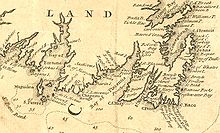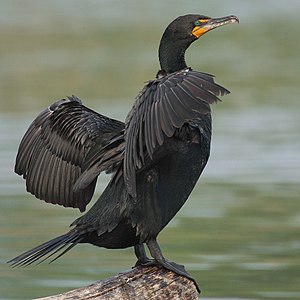Portal:Canada
| Showcase | Content | Contributing |
Introduction
Canada is a country in North America. Its ten provinces and three territories extend from the Atlantic Ocean to the Pacific Ocean and northward into the Arctic Ocean, making it the world's second-largest country by total area, with the world's longest coastline. Its border with the United States is the world's longest international land border. The country is characterized by a wide range of both meteorologic and geological regions. It is a sparsely inhabited country of 40 million people, the vast majority residing south of the 55th parallel in urban areas. Canada's capital is Ottawa and its three largest metropolitan areas are Toronto, Montreal, and Vancouver.
Canada is a parliamentary democracy and a constitutional monarchy in the Westminster tradition. The country's head of government is the prime minister, who holds office by virtue of their ability to command the confidence of the elected House of Commons and is "called upon" by the governor general, representing the monarch of Canada, the ceremonial head of state. The country is a Commonwealth realm and is officially bilingual (English and French) in the federal jurisdiction. It is very highly ranked in international measurements of government transparency, quality of life, economic competitiveness, innovation, education and gender equality. It is one of the world's most ethnically diverse and multicultural nations, the product of large-scale immigration. Canada's long and complex relationship with the United States has had a significant impact on its history, economy, and culture.
A developed country, Canada has a high nominal per capita income globally and its advanced economy ranks among the largest in the world, relying chiefly upon its abundant natural resources and well-developed international trade networks. Recognized as a middle power, Canada's strong support for multilateralism and internationalism has been closely related to its foreign relations policies of peacekeeping and aid for developing countries. Canada is part of multiple international organizations and forums. (Full article...)
Featured article -
The Newfoundland expedition was a naval raiding expedition led by English Captain John Leake between August and October 1702 that targeted French colonial settlements on the North Atlantic island of Newfoundland and its satellite, Saint Pierre. The expedition occurred in the early days of Queen Anne's War, as the North American theater of the War of the Spanish Succession is sometimes known. (Full article...)
Featured biography -

Frances Kathleen Oldham Kelsey CM (née Oldham; July 24, 1914 – August 7, 2015) was a Canadian-American pharmacologist and physician. As a reviewer for the U.S. Food and Drug Administration (FDA), she refused to authorize thalidomide for market because she had concerns about the lack of evidence regarding the drug's safety. Her concerns proved to be justified when it was shown that thalidomide caused serious birth defects. Kelsey's career intersected with the passage of laws strengthening FDA oversight of pharmaceuticals. Kelsey was the second woman to receive the President's Award for Distinguished Federal Civilian Service, awarded to her by John F. Kennedy in 1962. (Full article...)
Selected panorama -
National symbol -

A mari usque ad mare (Latin: [aː ˈmariː ˈuːskᶣɛ ad ˈmarɛ]; French: D'un océan à l'autre, French pronunciation: [dœ̃nɔseˈã aˈloʊ̯tʁ]; English: From sea to sea) is the Canadian national motto. The phrase comes from the Latin Vulgate translation of Psalm 72:8 in the Bible: (Full article...)
Selected vital article -

Canada has served in over 50 peacekeeping missions, including every United Nations (UN) peacekeeping effort from its inception until 1989. More than 125,000 Canadians have served in international peacekeeping operations, with approximately 130 Canadians having died during these operations. Canada's strong support for multilateralism and internationalism has been closely related to its peacekeeping efforts. (Full article...)
Selected picture -
Current events
- May 17, 2024 –
- The RCMP identifies the killer of four people in Calgary, Alberta, Canada, in 1976 and 1977 as American serial rapist Gary Allen Srery, who died in prison in 2011. (CFCN-TV)
- May 16, 2024 – Israel–Hamas war
- Global Affairs Canada announces sanctions on four "extremist" Israeli settlers in the West Bank for engaging in violence against Palestinian civilians and their property. (CBC News)
- May 15, 2024 – 2024 Canada wildfires
- Authorities evacuate over 6,000 people as wildfires approach the city of Fort McMurray, Alberta, Canada. (Reuters) (NPR)
- May 12, 2024 –
- Wildfires in British Columbia and Alberta, Canada, force thousands to evacuate. (CNN)
- May 3, 2024 – Canada–India diplomatic row
- Three Indian men are arrested in Canada and charged with the murder of Sikh separatist leader Hardeep Singh Nijjar last year. The Canadian government is investigating whether the men had ties to the Indian government. (Reuters) (Toronto Star)
- April 12, 2024 – War in Sudan
- Canada pledges $132.2 million dollars to Sudan to help people affected by the country's ongoing humanitarian crisis. (Global News)
Did you know -

- ... that Canadian running back Chase Brown ranked second in American college football with 1,643 rushing yards in 2022?
- ... that because of the increasing prevalence of sesame allergy, the U.S. will join the EU and Canada in 2023 in instituting mandatory food labeling?
- ... that journalist W. A. Hewitt refereed the first game played in the history of ice hockey at the Olympic Games?
- ... that the Canadian League for Peace and Democracy organized a 10,000-person rally at Maple Leaf Gardens in Toronto to protest a 2,500-person fascist rally?
- ... that journalist Bob Moir posed as medical staff on the Canadian Olympic team to report on the Munich massacre?
- ... that the Saskatchewan Conservation House, built in 1977 to withstand Canadian winter temperatures, did not use a furnace?
- ... that the Bancroft region is the only place in Canada and one of very few places in the world where uranium has been mined from pegmatite rock?
Featured list -
Canada is a federation that comprises ten provinces and three territories. Its government is structured as a constitutional monarchy and a parliamentary democracy, with a monarch as its sovereign and a Prime Minister as its head of government. Each of the country's provinces and territories also has a head of government, called premier in English. Collectively, the federal Prime Minister and provincial and territorial premiers are referred to as first ministers. In French, the term premier ministre is used in both the federal and provincial/territorial contexts. (Full article...)
Main articles
Associated Wikimedia
The following Wikimedia Foundation sister projects provide more on this subject:
-
Commons
Free media repository -
Wikibooks
Free textbooks and manuals -
Wikidata
Free knowledge base -
Wikinews
Free-content news -
Wikiquote
Collection of quotations -
Wikisource
Free-content library -
Wikiversity
Free learning tools -
Wikivoyage
Free travel guide -
Wiktionary
Dictionary and thesaurus






























